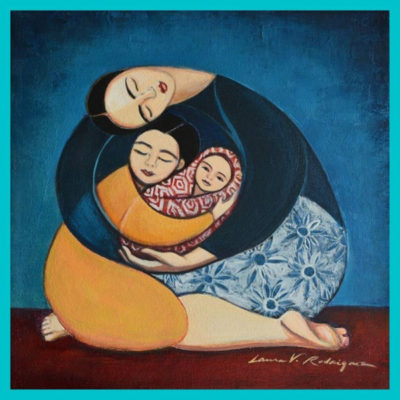For many years I have been feeling into the ways that western psychology has cultivated separation between mothers and daughters. I have often cringed inside when I hear people talk about the mother wound and the layers of internalized misogyny I feel within it (why is no one talking about the father wound?).
daughters. I have often cringed inside when I hear people talk about the mother wound and the layers of internalized misogyny I feel within it (why is no one talking about the father wound?).
Ancestral cultures did not separate parental units into dyads, leaving two people to parent by themselves, let alone one parent as is all too often the case for mothers. There are generally other support people whether aunties, grandparents, older cousins and children are often taken to the ‘workplace’ such as the fields, the kitchen, the community fire where they are able to engage with other children and be more content.
In this country women are left in their box/house/cage alone with highly dependent, isolated and thus unmet children and do not have the support of the village.
In my twenty plus years of working with mothers it is entirely clear that unsupported mothers/caregivers bearing the brunt of caring for children’s high needs on their own, leads to depletion which often leads to abusive behaviors, as a result of undue stress and lack of support and resources. Even the most well intentioned mother can find themselves spiraling into a dark crazy-making space. It is very very common for mothers to shame themselves for feeling more angry or rageful than they ever felt before in their life. Yet this rage does not belong to them. This anger emerges because they have never been so unsupported, helpless, and overwhelmed.
This lack of support is accepted as normal in this society and the mothers who stay (unlike many fathers) and do not abandon the parenting role but parent imperfectly, get maligned.
It is popular in western psychology for therapists to encourage clients to write off their problematic parents. And there are certainly cases when this is appropriate, life saving, healthy as in cases of severe abuse: physical, sexual, emotional. But because we are swimming in separation and blaming the victim as defaults, it is often overdone.
One area that I see this is when I am supporting someone who talks about feeling burdened by the way they feel their mother ‘uses them as a therapist.’ Often this involves a mother who tends to vent and complain about others, often people who mistreat them; family members, husbands, bosses. They lean on their daughters as a sounding board. It feels uncomfortable because it’s venting and venting is not fun to listen to, and many feel protective and feel a need to solve things for their mother, or they are sensitive and it is overwhelming to the nervous system. And traumatized mothers can heap on shame, guilt, obligation and manipulation as their wounded self tries to get their needs met. So, often it understandably feels like a burden.
There are not many good sides to growing up in foster care but one that I feel has distinguished my journey from others is that I never had a mother or father to rely on. As a young adult, I felt abandoned and harmed by both of my parents, but because they were too sick and clearly incapable, I was able to integrate that as an adult it was now my job to be my own parent. I took the responsibility of being my own mother and father and went on this reclamation journey.
When my mother would call me and want my help or my father wanted a relationship with me (after 38 years of abandonment) it definitely felt burdensome. I thought, “you didn’t even raise me, I was left to the wind, but you want me to take responsibility for you now?” But because I had accepted the job of being my own parent, because I was clear that they were not capable of mothering or fathering me, there was a way that I was able to tune in with more objectivity maybe. I was able to see them as just people with human needs and traumatized wounded parts that were messy.
(None of what I’m writing right now is a formula. Each person needs to honor what is right for them. I am just teasing this apart, unpacking the ways I have seen western psychology further disconnect the threads that are better held together by indigenous/ancestral cultures)
And because I took the role of being my own parent seriously, I tuned in to what felt loving for me and followed that as my guide. As my inner child felt safe that I was her mother/father with the help of Guidance, I was not attached to what my parents were doing. I wasn’t looking for their approval. I wasn’t trying to make them what I wanted/hoped for. I wasn’t handing my little girl to them. And this helped to me accept them as they were and be curious about ways we could restore threads of connection (I wrote another blog about this: )
This is of course because it was very very clear that they could not parent me.
And this was actually a great gift because with self-reclamation and ancestral/spiritual remembering
it is very very important to know that no one else can be the keeper of our soul, like us.
And when we are holding our inner child in our own arms, fully accepting responsibility for ourselves (which I feel was an ancestral norm), we can let go of expectations, surrender control/defense/protection and see our parents as humans within their context.
We can be gentle with ourselves, honoring our pain, their shortcomings, the injustices, while also not taking it personally.
Sometimes when I hear a mother is venting to a daughter, I think about how much patriarchy has oppressed women and I wonder why western psychology would vilify this, rather than reflect on the possibility that this daughter may be one of the only people the mother can confide in. And that maybe she does have a lot to vent about, and has never had or known how to receive support around her challenges. Maybe she is so thickly protected and defended because life has been so hard, steeped in misogyny/patriarchy, trauma and woefully under resourced.
I know many coming from a western mindset would see this as codependent.
And yet I feel an ancestral view would have so much more compassion; I feel it would see how very very wrong things were for this mother to be so unsupported/isolated/demoralized/undervalued, how of course she needs support, how she is not bad/wrong/needy for wanting to talk about things. How upside down it is that she only has her children to vent to (rather than community). How it is normal for those who have been through the journey of life in the most intimate way that this society offers, on the daily, to share about life with each other.
As a mother I have walked this fine line. I have been careful not to put my own needs onto my daughter/children and yet I have also been curious about what a mutually supportive relationship can look like as my children enter adulthood.
We have been put in a very unnatural situation as a collective and we are trying to patch it with unnatural solutions.
What would be ‘natural’ if great grandmothers, and grandmothers and aunties and mothers and daughters were supported and able to be together in whole community?
Though we have so few examples of this in colonized/hierarchical society which breeds intergenerational trauma,
the answer is still in our bones,
we have to dig deep to call it forth.
If we are lucky, we have had little glimpses of this whether in our family, a friend’s family, old stories, chosen community that we can expand as we reflect and open to this question….
And sometimes it emerges and unfolds as we step toward connection.
When we can hold onto ourselves as our own inner parents, we can tune into when and how much engagement would feel loving with our mothers/caregivers.
As long as there is not abuse, I encourage daughters to stay engaged with their mothers when they feel open to it, when they truly want to. And when in conversation, to let their inner child know that they will hold the internal boundary to disengage, change the subject, speak a boundary or move on, if anything no longer feels loving within the conversation.
I have found that over time, most daughters feel glad that they stuck through the discomfort and got to know their mothers as people. We can love and honor the core of someone while still acting on internal boundaries if their problematic features show up.
It’s a tricky dance at times but can be more fruitful and regenerative than defaulting to the separation/ individualism of western psychology. It can be how we heal intergenerational trauma, one relationship at a time.
I know I am very glad that I held my little girl’s heartbreak and longing and grief and anger compassionately and still showed up to learn my mothers’ recipes, to speak with her in my choppy Spanish, to hear her laugh and sing her Bolero and Ranchero songs. To lay on her bed in her tiny one bedroom apartment and nap when she urged ‘acuestate mija”
To see my pain and her pain and know that neither of us deserved this…
xoxo
—–
I am still unpacking this all, but these are some thoughts for now.
Beautiful art by Laura Vasquez
